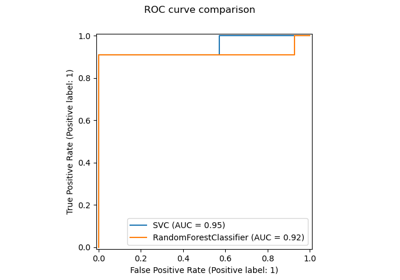parametrize_with_checks#
- sklearn.utils.estimator_checks.parametrize_with_checks(estimators, *, legacy: bool = True, expected_failed_checks: Callable | None = None)[source]#
Pytest specific decorator for parametrizing estimator checks.
Checks are categorised into the following groups:
API checks: a set of checks to ensure API compatibility with scikit-learn. Refer to https://scikit-learn.org/dev/developers/develop.html a requirement of scikit-learn estimators.
legacy: a set of checks which gradually will be grouped into other categories.
The
idof each check is set to be a pprint version of the estimator and the name of the check with its keyword arguments. This allows to usepytest -kto specify which tests to run:pytest test_check_estimators.py -k check_estimators_fit_returns_self
- Parameters:
- estimatorslist of estimators instances
Estimators to generated checks for.
Changed in version 0.24: Passing a class was deprecated in version 0.23, and support for classes was removed in 0.24. Pass an instance instead.
Added in version 0.24.
- legacybool, default=True
Whether to include legacy checks. Over time we remove checks from this category and move them into their specific category.
Added in version 1.6.
- expected_failed_checkscallable, default=None
A callable that takes an estimator as input and returns a dictionary of the form:
{ "check_name": "my reason", }
Where
"check_name"is the name of the check, and"my reason"is why the check fails. These tests will be marked as xfail if the check fails.Added in version 1.6.
- Returns:
- decorator
pytest.mark.parametrize
- decorator
See also
check_estimatorCheck if estimator adheres to scikit-learn conventions.
Examples
>>> from sklearn.utils.estimator_checks import parametrize_with_checks >>> from sklearn.linear_model import LogisticRegression >>> from sklearn.tree import DecisionTreeRegressor
>>> @parametrize_with_checks([LogisticRegression(), ... DecisionTreeRegressor()]) ... def test_sklearn_compatible_estimator(estimator, check): ... check(estimator)


